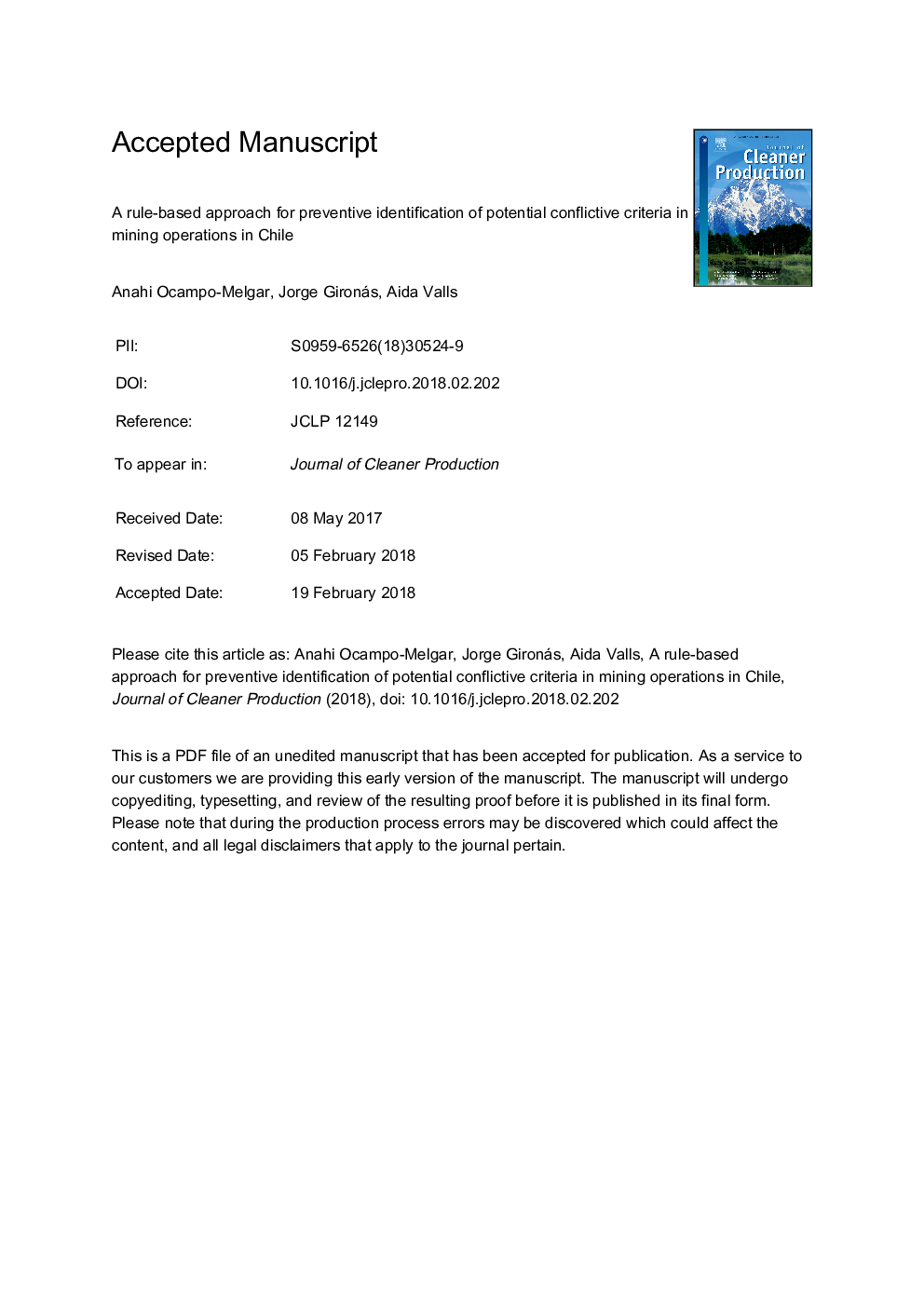| کد مقاله | کد نشریه | سال انتشار | مقاله انگلیسی | نسخه تمام متن |
|---|---|---|---|---|
| 8096754 | 1522069 | 2018 | 25 صفحه PDF | دانلود رایگان |
عنوان انگلیسی مقاله ISI
A rule-based approach for preventive identification of potential conflictive criteria in mining operations in Chile
ترجمه فارسی عنوان
یک رویکرد مبتنی بر قانون برای شناسایی پیشگیرانه معیارهای بالقوه متضاد در عملیات معدن در شیلی
دانلود مقاله + سفارش ترجمه
دانلود مقاله ISI انگلیسی
رایگان برای ایرانیان
کلمات کلیدی
تعارض اجتماعی و محیطی، ارزیابی محیطی، سیستم های کارشناس مبتنی بر قانون، سهامداران مشارکت، ادراکات،
ترجمه چکیده
پروژه های معدن، مانند بسیاری از فعالیت های استخراج شده دیگر، در طی فرآیند برنامه ریزی باعث عقب ماندگی می شود که ممکن است منجر به درگیری شود. درک ابتدایی از اولویت ذینفعان می تواند در طراحی پروژه های بهتر کمک کند، در حالی که کاهش منابع مناقشه بالقوه. هدف این مقاله ارائه روش مبتنی بر قاعده برای پشتیبانی تصمیم برای استفاده در مراحل اول پروژه برای شناسایی اختلاف نظرها در قالب معیارهای بالقوه درگیر است. روش پیشنهادی چهار ویژگی را تعریف می کند که باید برای معیارهای مختلف مرتبط با منازعه بالقوه مورد ارزیابی قرار گیرد: اهمیت معیار، ریسک درک شده، عدالت و تمایل طرفین در ایجاد گفتگو. این ویژگی ها برای ساخت یک سیستم مبتنی بر قانون استفاده می شود که می تواند درجه حساسیت برای درگیری برای هر معیار را ارزیابی کند. کاربرد این رویکرد مبتنی بر قاعده با استفاده از اطلاعاتی از یک درگیری واقعی در شیلی، که در آن نه معیار در نظر گرفته شد، چهار تصمیم گیرنده اصلی مصاحبه شد و 81 قانون ایجاد شد، توضیح داده شده است. خروجی داده شده توسط سیستم مبتنی بر قاعده با درجه تضاد داده شده توسط چهار تصمیم گیرندگان مقایسه شد. نتایج نشان می دهد که در 44.4٪ از پاسخ ها سطح رتبه یکسان بود، در 44٪ یک ارزیابی جزئی و در 11٪ بیش از حد معیار سطح درگیری وجود دارد. روش پیشنهادی جنبه های جدیدی را در تجزیه و تحلیل منابع مناقشات بالقوه به کار می برد و به اندازه کافی ساده برای پیش بینی پیشگیری از اختلافات بالقوه در اطراف معیارها است. علاوه بر این، این نوع رویکرد پیشگیرانه در مراحل اولیه ارزیابی پروژه می تواند به طراحی طرح بهتر و گفتگو سازنده صنعتی-اجتماعی کمک کند.
موضوعات مرتبط
مهندسی و علوم پایه
مهندسی انرژی
انرژی های تجدید پذیر، توسعه پایدار و محیط زیست
چکیده انگلیسی
Mining projects, as with many other extractive activities, result in divergent opinions during the planning process which may trigger conflict. Early understanding of stakeholders' priorities can help with the design of better projects while reducing sources of potential conflict. The objective of this article is to present a rule-based method for decision support to be used in the first stages of the project to identify disagreements in the form of potentially conflictive criteria. The method proposed defines four attributes that should be evaluated for the different relevant criteria subject to potential conflict: the importance of the criterion, the perceived risk, the fairness, and the affected side's willingness to make dialogue. These attributes are used to construct a rule-based system that can assess the degree of sensibility to conflict for each criterion. The application of this rule-based approach is explained using information from a real past conflict in Chile, where nine criteria were considered, four key decision makers were interviewed and 81 rules were created. The output given by the rule-based system was compared with the conflict degree given by the four decision makers. Results show that in 44.4% of the responses the rank level was the same, in 44% there was a slight subestimation and in 11% an overestimation of the criterion conflictive level. The method proposed incorporates new aspects into the analysis of sources of potential conflict and is simple enough for an anticipatory screening of potential disagreements around the criteria. In addition, this type of precautionary approach in the earlier stages of project appraisal can contribute to a better project design and a constructive industry-community dialogue.
ناشر
Database: Elsevier - ScienceDirect (ساینس دایرکت)
Journal: Journal of Cleaner Production - Volume 184, 20 May 2018, Pages 559-568
Journal: Journal of Cleaner Production - Volume 184, 20 May 2018, Pages 559-568
نویسندگان
Anahi Ocampo-Melgar, Jorge Gironás, Aida Valls,
